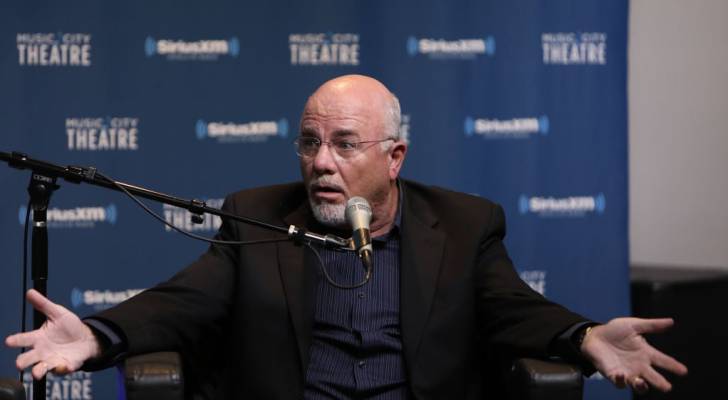Anna Webber/Getty Images
Moneywise and Yahoo Finance LLC may earn commission or revenue through links in the content below.
While the headlines have been dominated by a rollercoaster in the stock market, financial guru Dave Ramsey isn’t going doom-and-gloom.
In fact, the radio host believes every young American has a shot at becoming a millionaire.
“If you’re under 40 years old and you don’t retire a millionaire, that’s no one’s fault but yours,” the 64-year-old posted on X, formerly known as Twitter.
Here’s a closer look at the math behind his exhortation.
Despite the economic challenges facing young Americans, Ramsey believes that the average 25-year-old needs to save just a fraction of their annual income to retire at 65 with over $1 million.
However, his thesis assumes that this 25-year-old invests in “good growth stock mutual funds.” Diligently investing just $100 a month into such growth funds could create a $1,176,000 nest egg within 40 years, according to Ramsey’s calculations. Choosing the right fund is a big part of this.
For example, since 2010 the Vanguard S&P 500 ETF (VOO) has delivered a compounded annual growth rate of 14.00%. Meanwhile, the S&P 500 has posted an impressive average annual return of 10.13% since 1957.
The appeal of these platforms lies in their accessibility. Anyone, regardless of wealth, can participate.
The four variables for compound growth calculations are time, initial investment, regular investment and growth rate. Of these, the only variable you can somewhat control is regular investment.
Investing $200 or $300 a month could help you create a nest egg significantly bigger than just $1 million. Ramsey recommends setting the bar even higher at 15% of gross annual income.
“The average household income in America today is $79,000. If you invested 15% of that ($11,850 a year), you would retire with around $11.6 million,” he wrote in the same thread on X.
However, most Americans are saving significantly less than Ramsey’s target. As of May 2025, the average personal savings rate is just 4.5%, according to data by the Bureau of Economic Analysis.
Story Continues
Another common financial mistake is keeping your money in low-interest savings accounts. High-yield savings accounts can offer returns up to 10 times higher than those from traditional banks, according to NBC Select and Dynata Banking Behaviors. 82% of those surveyed weren’t using this type of account.
Read more: Rich, young Americans are ditching the stormy stock market — here are the alternative assets they’re banking on instead
Once you’ve started to save in earnest, it’s crucial to protect your portfolio against inflation. Investing in real estate can help diversify your holdings and grow your wealth over the long term.
New investing platforms are making it easier than ever to tap into the real estate market.
For accredited investors, Homeshares gives you access to the $36 trillion U.S. home equity market, which has historically been the exclusive playground of institutional investors.
With a minimum investment of $25,000, investors can gain direct exposure to hundreds of owner-occupied homes in top U.S. cities through their U.S. Home Equity Fund — without the headaches of buying, owning or managing property.
With risk-adjusted internal returns ranging from 12% to 18%, this approach provides an effective, hands-off way to invest in owner-occupied residential properties across regional markets.
If you’re not an accredited investor, crowdfunding platforms like Arrived allow you to enter the real estate market for as little as $100.
Arrived offers you access to shares of SEC-qualified investments in rental homes and vacation rentals, curated and vetted for their appreciation and income potential.
Backed by world-class investors like Jeff Bezos, Arrived makes it easy to fit these properties into your investment portfolio regardless of your income level.
Arrived’s flexible investment amounts and simplified process allows accredited and non-accredited investors to take advantage of this inflation-hedging asset class without any extra work on your part.
Homeownership can be a key stepping stone to reaching millionaire status by retirement. Refinancing your mortgage to accelerate your ownership is one way to get ahead.
Refinancing your home loan could help you pay off your mortgage early in two ways. By securing a lower interest rate, you can either maintain your current monthly payment while more of it goes toward the principal, or you can opt for a shorter loan term to accelerate your path to homeownership.
When you refinance to a shorter term, such as moving from a 30-year to a 15-year mortgage, you’ll typically receive a lower interest rate while significantly reducing the total interest paid over the life of your loan. Though your monthly payments may increase, you’ll build equity faster and own your home outright years earlier than planned.
Money doesn’t have to be complicated — sign up for the free Moneywise newsletter for actionable finance tips and news you can use. Join now.
This article provides information only and should not be construed as advice. It is provided without warranty of any kind.
